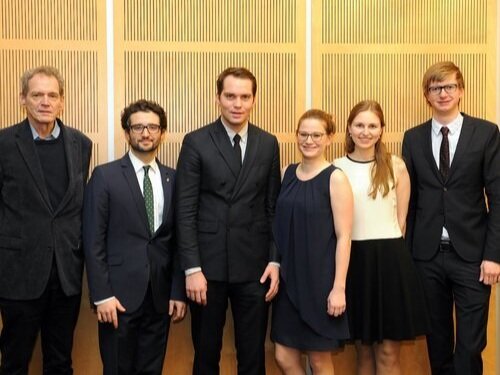Obermayer German Jewish History Award
Heinrich Schreiner
Mainz, Rhineland-Palatinate
Dr. Heinrich Schreiner had an impressive career in government, achieving the position of president of the Central Bank of the state of Rheinland-Pfalz by the time of his retirement. But his retirement represented the beginning of a new career in which he dedicated his time and skills to reconstructing the dilapidated synagogue of Mainz. It was the only synagogue remaining in this city which had been the leading German center of Jewish study over 1,000 years ago and throughout the Middle Ages.
Dr. Schreiner received a Ph.D. in public economy, and has always been a leader in the Catholic church, but his idealism, wide knowledge and administrative experience made him ideally suited to be president of the Förderverein Synagogue Mainz. As the head of this dedicated group, he raised the funds (about $2 million); encouraged community leaders to participate; engaged the architects; handled the complex legal, business and political issues; and oversaw the physical restoration of the synagogue. The structure, built in 1737, was damaged in 1793 during the French siege on Mainz, was rededicated in 1819, and was vandalized during Kristallnacht but never completely burned down because of its proximity to many houses. After World War II, the site was used as a hen-coop, a lumber storage facility, and finally a dump. The decayed building was rediscovered in 1977 during the preparation of an exhibit about the Jews of Mainz. The property, which had been deeded to the city in 1987, required emergency measures to prevent the complete collapse of the building. Restoration only became a reality when Dr. Schreiner raised the necessary funds and personally committed himself to the completion of the project.
The synagogue is in the Weisenau section of Mainz, which once had been the center of a very large and vibrant Jewish community. Formerly, Jews were forbidden to live in the center of Mainz, and settled nearby in Weisenau. The building, beautifully reconstructed in its original baroque style, was consecrated on May 27,1996, marking the 900th anniversary of the massacre of the Jews of Mainz during the first crusade of 1096.
Under Dr. Schreiner’s leadership, the synagogue and its small museum have become a center of Jewish learning for the entire community. On the Sabbath and on Jewish holy days the synagogue is used exclusively for Jewish religious services. At all other times, the synagogue is the site of frequent free lectures, concerts and exhibitions on Jewish subjects, some of which focus on the history and culture of the Mainz Jewish community. Dr. Schreiner moderates all meetings and personally guides tours through the synagogue, describing its function and its history. His current project is the restoration of two old mikvaot, or ritual baths, which were discovered just outside the synagogue. They have great historical significance and will be open to the public when they are restored.
Today the synagogue is a place of religious services for Jews, a memorial to Jewish suffering throughout the ages, and a gathering place where Jewish history and culture can be appreciated and shared by all. The work of Dr. Schreiner has made it possible for people of different faiths to engage in a positive dialogue that enhances mutual respect.
THIS WALL BRINGS PEOPLE TOGETHER
Students at this Berlin elementary school, built on the site of a synagogue, have been building a wall for the past two decades. It delivers a powerful message about community.
STUDENTS REACHING STUDENTS
When a handful of ninth graders from Berlin met Rolf Joseph in 2003, they were inspired by his harrowing tales of surviving the Holocaust. So inspired that they wrote a popular book about his life. Today the Joseph Group helps students educate each other on Jewish history.
“I SPEAK FOR THOSE WHO CANNOT SPEAK”
Margot Friedländer’s autobiography details her struggles as a Jew hiding in Berlin during World War II. Now 96, she speaks powerfully about the events that shaped her life and their relevance today.



